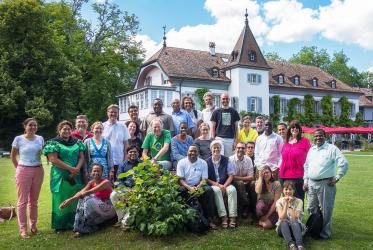Displaying 141 - 160 of 181
17 November 2015
Common prayer in Geneva responds to acts of violence
16 November 2015
Climate pilgrimage toward COP21 pauses in Geneva
05 November 2015
Religion and Violence relationship probed
29 October 2015
WCC urges responsibility for and support to the refugees in Europe
04 September 2015
New departure in Taizé towards an ecumenism of solidarity
20 August 2015
WCC Executive Committee speaks out on migrant crises
12 June 2015
Understanding justice and peace as Christian pilgrims
15 January 2015
Momentum builds for ban on nuclear weapons
16 December 2014
Water network develops a theological framework for water justice
12 December 2014
Prayers, reflections and action during “Time for Creation”
15 September 2014
WCC hosts Global Energy Parliament exploring “science of peace”
09 September 2014
The WCC: Seventy-five years in Geneva, 1939-2014
04 July 2014
“You don't all have to be the same”
01 July 2014
Addressing ecology, theology and justice in practice
01 July 2014







